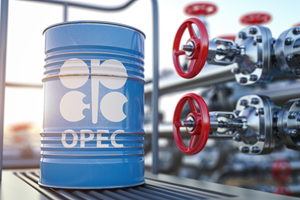(Bloomberg) – Senior officials from three of OPEC’s core producer nations — Saudi Arabia, the United Arab Emirates, and Kuwait — lined up to say that the super-sized addition of supply by the producer club at the weekend was needed by the global market.

Oil prices managed gains this week, a sign that the market has largely shrugged off the larger-than-expected output hike announced on Saturday by the Organization of the Petroleum Exporting Countries and allies. Despite the current tightness, forecasters are pointing out that supply growth is at risk of outpacing demand later in the year.
“You can see that even with the increase in several months, we haven’t seen a major buildup in the inventories, which means the market needed those barrels,” said Suhail Al Mazrouei, the United Arab Emirates energy minister, on the sidelines of a conference that the group is holding in Vienna. His comments were echoed by officials at the state oil companies of Saudi Arabia and Kuwait.
Signs of a tight market include crude oil stockpiles at the key U.S. storage hub of Cushing, Oklahoma that are at their lowest seasonally since 2014, as well as a collapse in America’s diesel inventories. Timespreads point to tight supply-and-demand dynamics in the near term.
In April, OPEC+ announced — to the surprise of the market — the addition of 411,000 bpd of production to the global market, repeating the increase again in May and June. It went one step further on Saturday with a hike of 548,000 bpd.
Sheikh Nawaf Al-Sabah, chief executive officer of Kuwait Petroleum Corp., said Wednesday in a Bloomberg TV interview on the sidelines of the seminar that the market’s in good shape. “We’re seeing some potential tightness in the market, which gives us an opportunity to capture market share in the future,” he said.
Speaking with Bloomberg TV on Thursday, the Republic of Congo’s Minister of Hydrocarbons Bruno Jean-Richard Itoua said it was premature to reveal the group’s next move, but if the data show a need to add further barrels in September, they’ll do it.
“You know OPEC and OPEC+, what we want isn’t to increase prices or decrease prices — we’re not playing games,” he said. “We want the best stability for the market,” said Itoua.

